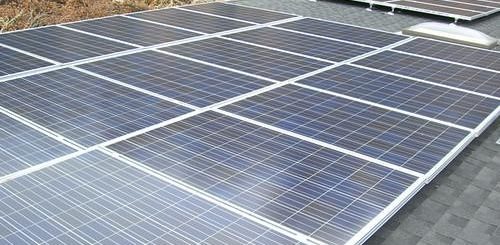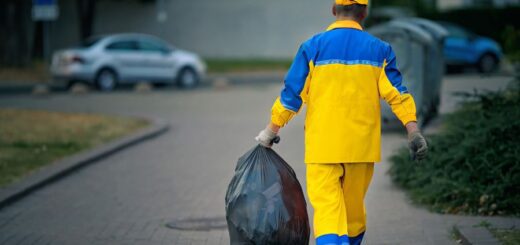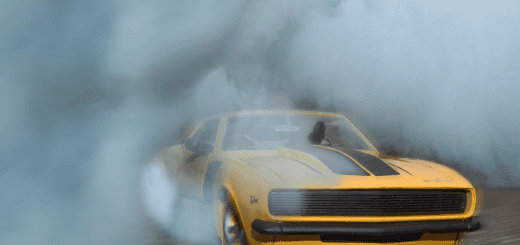How to Avoid Common Kitchen Hazards
For some, the kitchen is a place to partake in the art of cooking. For others, the kitchen might simply be a place where food is consumed in the company of friends and family. But the kitchen is unfortunately also a place where accidents occur often.
Even if you are comfortable in the kitchen and consider yourself to be a great cook, everyone must be cautious when working in the kitchen. The potential dangers involved with cooking are no secret given the frequent use of fire, hot oils, and other heat sources. But cooking incidents are just a few of several kitchen hazards people can encounter. From falls to cooking fires to electrical issues, there are numerous ways an incidentAn incident is an event or occurrence that causes damage, di... More can occur in the kitchen that results in damage or injuries.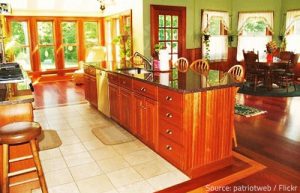
Continue reading to learn more about common kitchen hazards, how to how avoid these dangers, and how to react if there is an issue like a fire.
1. Handling Items
Too much of anything can become overwhelming. In the kitchen, handling too many items at once is not only overwhelming but dangerous as well. This can include trying to carry too many plates and/or dirty dishes at once or moving equipment and other items without any assistance. Doing so can result in dropping and damaging items.
Even if you manage to successfully handle and transport a large amount of items at once, you risk hurting yourself. Because of this, do not take on more than you can handle. Make multiple trips if you need to transport dishes and get help from someone else when moving heavy items.
2. Tripping and Falling Hazards
Although falls can occur in any setting, there is a high risk of tripping and/or suffering a fall in the kitchen. One of the most common culprits in kitchen falls is spills.
3. Spills
When cooking, people can easily spill water, oil, grease, or flour on the ground. It’s almost inevitable, making it even more important to clean up any spills right away. If not, there’s more time for people to slip on the mess and fall as a result. If a fall does occur, there’s also a greater chance for another accident to follow.
For example, if an individual slips on an oil spill, they might fall and injure themselves. During the fall, they might knock over pots that were on the stove and cause a cooking fire in the process.
However, people can also slip and fall on a wet spot that was recently cleaned. Knowing this, practice proper kitchen safety practices and dry up the wet spot to prevent falls. Placing a caution sign for wet floors is helpful as well, but the sign and wet spot can still act as tripping/falling hazards.
4. Obstructions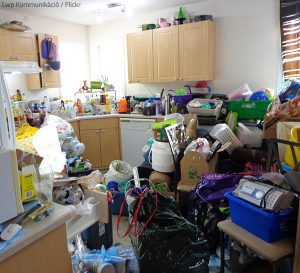
Aside from spills, items obstructing walkways can also cause people to trip and fall. Knowing this, do not leave any items in walkways, especially any cords and cables for appliances. Put these objects in a place off to the side or elsewhere where they will not be in anyone’s way.
5. Ladders
In some commercial settings, various foods and ingredients are stored on numerous shelves. Some of these shelves require ladder use to access the higher-up items. If a ladder is used to retrieve items from shelves, be careful using it. Do not carry too heavy of a load while using it and never substitute a ladder by using a chair or lower shelves either.
Fire Hazards
1. Heat and Fuel
The primary function of a kitchen is to be a place where cooking can be conducted, which automatically presents hazards. Cooking requires heat and/or open flames, oils, and grease. The combination of such can easily leadLead is a heavy metal that can be toxic to humans, especiall... More to cooking fires if proper kitchen safety is not followed.
Knowing this, you can prevent such kitchen hazards by keeping flammable items away from heat sources. This includes wearing the proper attire for cooking. When cooking, wear fitted clothing that does not feature anything too loose or dangling that may catch fire. Clean up any spills right away, too. If using the stove, make sure any pots and pans with handles are turned inward. This will prevent them from being knocked over, causing a fire to break out.
When finished cooking, check that all appliances are off. Clean the space of any grease, oil, crumbs, and other messes so they can’t catch fire when you cook next time.
2. Electrical Equipment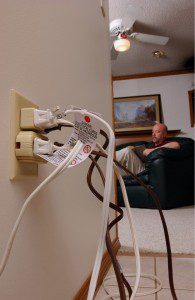
Electrical equipment and appliances help make cooking easier, but they can cause serious problems if used incorrectly.
Only use appliances and equipment as intended. Using them for other purposes increases your risk of an incidentAn incident is an event or occurrence that causes damage, di... More. Most notably, inspect your equipment’s cables, cords, and plugs. If you discover any exposed wiring, fraying, burn marks, and other similar signs, then do not use the item because it may start an electrical fire. Have the item repaired by a professional or replaced.
Professional Fire Damage Restoration Services
In the event that a fire breaks out in your kitchen, take immediate action. Whether it’s a residential or commercial property, evacuate the place to ensure everyone is safe and call your local fire department to have the fire put out. Once the fire has been extinguished, seek help from professional fire damage restoration services.
When dealing with a fire, it’s crucial to get immediate help because of the permanent damage the fire and its after-effects can cause. The longer you wait to restore the property, the worse the damage gets; don’t hesitate to call a fire restoration professional so your home or business can be thoroughly cleaned and restored to a safe, healthy environment.
A licensed fire damage restorationFire damage restoration is the process of repairing and rest... More professional will respond right away, addressing the surfaces and items facing the highest risk of permanent damage first. They will then stabilize the building and board up the windows and doors to prevent additional damage or even collapse. Using advanced cleaning products and equipment they will then remove all smoke and sootSoot is fine black particles composed of carbon and other ma... More residueResidue is any leftover material, such as soot, dust, or che... More, followed by removing soiled items.
After restoring your home or building and contents, you can look forward to moving back in while saving money after the restorationRestoration is the process of returning a property to its pr... More process.










